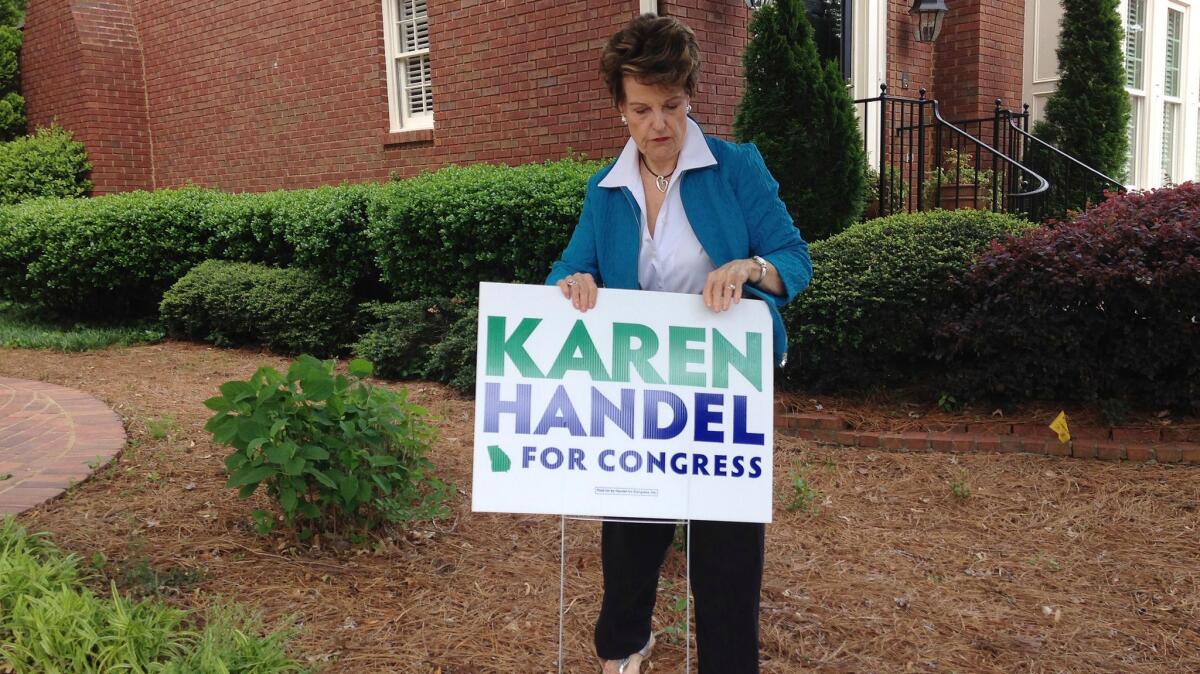Civil rights groups challenge registration deadline in Georgia House race

Reporting from Atlanta â After an election this week in which Georgia Republicans forced Democrat Jon Ossoff into a run-off for a closely contested House seat, Virginia Kilgore looked forward to voting for him on June 20.
Then she learned that under a quirk in Georgia law she wonât be allowed.
The state constitution stipulates that only those who registered to vote in the general election are entitled to vote in a run-off election, meaning that anybody who wasnât registered by March 20 is ineligible to vote in the election.
âItâs so frustrating,â said Kilgore, a 57-year old substitute teacher.
She had recently moved to the district and was not able to vote in Tuesdayâs election due to a misunderstanding when she updated her driverâs license. But she assumed she would have plenty of time to register before June 20.
âWhy do the same rules not apply to the runoff as to any other election?â she said. âWhy are they trying to make it harder for people to vote?â
On Thursday, the Lawyersâ Committee for Civil Rights Under Law, a Washington-based advocacy group, filed a complaint in federal court in Atlanta, claiming Georgiaâs law violates the 1993 National Voter Registration Act, which prohibits states from imposing a registration deadline of more than 30 days before any federal election.
âCutting off the registration period makes absolutely no sense,â said Ezra Rosenberg, co-director of the committeeâs Voting Rights Project. âWe should be doing everything to help people vote. Not putting arbitrary blocks in front of them, particularly blocks that are in violation of federal statutes. Itâs just wrong.â
At least 100 people have already learned that they will not be allowed to vote in the June election because of the law, and thousands more could be in the same situation as they try to register, Rosenberg said.
David Dove, chief of staff for the Georgia Secretary of Stateâs office, issued a statement dismissing the lawsuit as âpolitical theatre.â
âSetting voter qualifications is completely within the purview of states and the U.S. Constitution and cannot be altered byâ the National Voter Registration Act, it said.
But Daniel Tokaji, a professor of constitutional law at The Ohio State University, said the Georgia law was a clear violation of longstanding federal voting rights law.
âI donât think that Georgia has much of a legal leg to stand on,â he said. âGeorgia has an obligation to follow federal law, period,â he said.
The stakes are particularly high in this election, which will fill a seat vacated when Tom Price was confirmed as the secretary of Health and Human Services. The race is widely seen as an early referendum on President Trump.
Ossoff, a 30-year-old documentary filmmaker and former Congressional aide making his first run for public office in a traditionally Republican district of suburban Atlanta, finished in first place Tuesday with 48.1% of the vote, shy of the 50% he needed to win the seat outright.
He will face the leading Republican, Karen Handel, a former Georgia secretary of state, in the run-off.
âIn this very critical election that has national implications, all voices should be heard,â said Francys Johnson, an attorney who is president of the Georgia NAACP, one of the civil rights groups that is a plaintiff in the case. âThatâs what this is about â whether we will be expansive in our view of who can make decisions in search of a common good or hold to traditional notions that this right should only be exercised by a few.â
Civil rights groups have long accused Georgia officials of gerrymandering districts and restricting voting rights. In 2005, Georgia was one of the first states in the nation to pass a strict law requiring voters to show government-issued photo identification at the polls.
ALSO
Justice Department pushes California and 8 other jurisdictions on âsanctuary citiesâ
Arkansas carries out its first execution since 2005
UPDATES:
3:30 p.m.: This article was updated with details about the law, the story of one voterâs experience and commentary from experts.
This article was originally published at 9:15 a.m.
More to Read
Sign up for Essential California
The most important California stories and recommendations in your inbox every morning.
You may occasionally receive promotional content from the Los Angeles Times.











